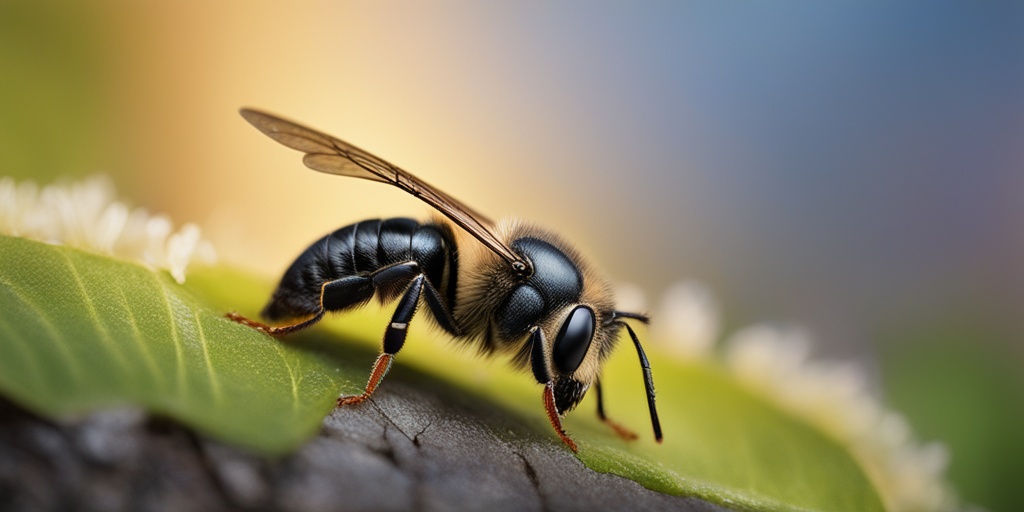“`html
What Are Insect Sting Allergies?
Insect sting allergies are a type of hypersensitivity reaction that occurs when the immune system overreacts to the venom injected by certain insects. This can lead to a range of symptoms, from mild discomfort to severe, life-threatening reactions known as anaphylaxis. Understanding these allergies is crucial for those who have experienced reactions to insect stings, as well as for their friends and family who may need to respond in an emergency.
How Do Insect Sting Allergies Develop?
Insect sting allergies typically develop after a person has been stung by an insect and their immune system mistakenly identifies the venom as a harmful substance. The first sting may not cause a significant reaction, but subsequent stings can trigger an exaggerated immune response. This phenomenon is known as sensitization.
Symptoms of Insect Sting Allergies
The symptoms of insect sting allergies can vary widely among individuals. Common symptoms include:
- Local Reactions: Swelling, redness, and pain at the sting site.
- Systemic Reactions: Hives, itching, and swelling in areas away from the sting site.
- Anaphylaxis: A severe, life-threatening reaction that can cause difficulty breathing, rapid heartbeat, and loss of consciousness.
If you or someone you know experiences symptoms of anaphylaxis, it is critical to seek emergency medical help immediately.
Common Insect Sting Allergens
Several types of insects are known to cause allergic reactions through their stings. Understanding these common allergens can help individuals avoid potential stings and manage their allergies effectively.
1. Bees
Bee stings, particularly from honeybees and bumblebees, are among the most common causes of insect sting allergies. The venom contains proteins that affect skin cells and the immune system, leading to allergic reactions. Interestingly, some individuals may be allergic to bee stings but not honey, as the allergy is specifically to the venom rather than the honey itself.
2. Wasps
Wasps, including yellow jackets and hornets, are another significant source of insect sting allergies. Their venom can cause severe allergic reactions, and many people report being allergic to wasp stings. Unlike bees, wasps can sting multiple times, increasing the risk of a severe reaction.
3. Fire Ants
Fire ants are notorious for their painful stings, which can lead to allergic reactions in some individuals. Their venom contains alkaloids that can cause intense itching and swelling, and in some cases, anaphylaxis.
4. Other Insects
While bees and wasps are the most well-known culprits, other insects such as hornets and certain types of ants can also trigger allergic reactions. It’s essential to be aware of your environment and the types of insects that may be present, especially during outdoor activities.
Managing Insect Sting Allergies
If you suspect you have an allergy to insect stings, it is advisable to consult with an allergist for proper testing and diagnosis. They may recommend:
- Allergy Testing: Skin or blood tests can help determine specific allergies.
- Emergency Action Plan: Developing a plan that includes carrying an epinephrine auto-injector (EpiPen) for severe reactions.
- Allergen Avoidance: Learning how to avoid stings by being cautious in areas where these insects are prevalent.
For more information on managing allergies and finding evidence-based health answers, consider visiting Yesil Health AI. They provide valuable resources to help you navigate your health concerns.
In conclusion, understanding allergies to insect stings is vital for prevention and management. By recognizing the common allergens and knowing how to respond to allergic reactions, you can protect yourself and those around you from potentially dangerous situations. 🐝🚫
“`

“`html
Symptoms of Insect Sting Allergies
Allergies to insect stings can manifest in various ways, and recognizing the symptoms is crucial for timely intervention. While some individuals may experience mild reactions, others may face severe consequences. Here’s a closer look at the common symptoms associated with allergies to insect stings.
Mild Reactions
Mild reactions typically occur shortly after being stung and may include:
- Localized swelling: A small area around the sting site may swell and become red.
- Pain or itching: The sting site can be painful or itchy, similar to a mosquito bite.
- Rash: Some individuals may develop a rash around the sting area.
These symptoms, while uncomfortable, are generally not life-threatening and can often be managed with over-the-counter medications like antihistamines or topical creams.
Moderate Reactions
In some cases, individuals may experience moderate reactions that require more attention. Symptoms may include:
- Widespread hives: Hives can appear on areas of the body away from the sting site.
- Swelling: Swelling may extend beyond the sting site, affecting larger areas of the body.
- Gastrointestinal symptoms: Nausea, vomiting, or diarrhea may occur.
If you notice these symptoms, it’s essential to monitor your condition closely and seek medical advice if they worsen.
Severe Reactions and Anaphylaxis
For some individuals, allergies to insect stings can lead to severe reactions, known as anaphylaxis. This is a medical emergency that requires immediate attention. Here are the signs to watch for:
- Difficulty breathing: Wheezing or shortness of breath can indicate swelling in the throat.
- Rapid heartbeat: A sudden increase in heart rate may occur.
- Swelling of the face or throat: This can lead to difficulty swallowing or speaking.
- Dizziness or fainting: A drop in blood pressure can cause lightheadedness or loss of consciousness.
If you or someone else experiences these symptoms after an insect sting, call emergency services immediately. Anaphylaxis can progress rapidly, and prompt treatment is critical.
Severe Reactions and Anaphylaxis
Understanding the severity of reactions to insect stings is vital for anyone who has experienced allergies to insect stings. Anaphylaxis is the most serious form of allergic reaction and can be life-threatening if not treated promptly.
What Causes Anaphylaxis?
Anaphylaxis occurs when the immune system overreacts to an allergen, such as venom from a bee or wasp sting. This overreaction triggers the release of chemicals like histamine, leading to a cascade of symptoms throughout the body.
Recognizing Anaphylaxis
It’s essential to recognize the signs of anaphylaxis early. Symptoms can develop within minutes of being stung and may include:
- Skin reactions: Severe hives, itching, or flushing.
- Respiratory issues: Tightness in the chest, difficulty breathing, or a feeling of impending doom.
- Cardiovascular symptoms: A rapid or weak pulse, low blood pressure, or fainting.
Individuals who have had a severe reaction in the past are at a higher risk for future anaphylactic episodes. It’s crucial to have an action plan in place, which may include carrying an epinephrine auto-injector (EpiPen) at all times.
What to Do in Case of Anaphylaxis
If you suspect someone is experiencing anaphylaxis, follow these steps:
- Call emergency services: Time is of the essence, so don’t hesitate to seek professional help.
- Administer epinephrine: If the person has an EpiPen, use it immediately. This can help reverse the symptoms.
- Position the person: Have them lie down and elevate their legs to improve blood flow.
- Monitor symptoms: Keep an eye on their condition until help arrives.
Being informed and prepared can make a significant difference in the outcome of an allergic reaction to insect stings. Always consult with a healthcare professional for personalized advice and treatment options.
“`

“`html
Diagnosis of Insect Sting Allergies
Insect sting allergies can be a serious health concern, affecting many individuals worldwide. Understanding how these allergies are diagnosed is crucial for effective management and treatment. If you suspect you might be allergic to insect stings, here’s what you need to know about the diagnostic process.
Recognizing Symptoms
The first step in diagnosing an allergy to insect stings is recognizing the symptoms. Common reactions can vary significantly from person to person. Here are some typical signs to watch for:
- Local reactions: Swelling, redness, and pain at the sting site.
- Systemic reactions: Hives, itching, difficulty breathing, and swelling of the face or throat.
- Anaphylaxis: A severe, life-threatening reaction that requires immediate medical attention.
If you experience any of these symptoms after an insect sting, it’s essential to seek medical advice promptly.
Medical History and Physical Examination
Your healthcare provider will begin the diagnosis by taking a detailed medical history. This includes:
- Your previous reactions to insect stings.
- Any family history of allergies.
- Other allergies or medical conditions you may have.
A physical examination will also be conducted to assess your overall health and any visible reactions to previous stings.
Allergy Testing
To confirm an allergy to insect stings, your doctor may recommend specific allergy tests. The most common methods include:
- Skin prick tests: A small amount of the allergen is introduced into your skin to observe for a reaction.
- Blood tests: These tests measure the level of specific antibodies (IgE) in your blood that are produced in response to allergens.
These tests help determine if you are allergic to bee stings, wasp stings, or other insect stings, allowing for a tailored treatment plan.
Treatment Options for Allergies
Once diagnosed, managing allergies to insect stings is crucial for your health and well-being. Treatment options vary based on the severity of your allergy and may include the following:
Immediate Treatment for Allergic Reactions
If you experience a mild allergic reaction, over-the-counter medications can help alleviate symptoms:
- Antihistamines: Medications like diphenhydramine (Benadryl) can reduce itching and swelling.
- Corticosteroids: Creams or oral medications can help manage inflammation.
For more severe reactions, such as anaphylaxis, immediate treatment with an epinephrine auto-injector (EpiPen) is essential. Always carry one if you have a known allergy!
Long-term Management Strategies
For individuals with a history of severe reactions, long-term management may involve:
- Allergen Immunotherapy: This treatment gradually desensitizes your immune system to the allergens, reducing the severity of reactions over time.
- Education and Awareness: Understanding your triggers and how to avoid them is vital. This includes recognizing the types of insects that may pose a risk.
Emergency Action Plan
Creating an emergency action plan is crucial for anyone with a severe insect sting allergy. This plan should include:
- Instructions on how to use an epinephrine auto-injector.
- Contact information for your healthcare provider.
- Steps to take in case of a sting, including when to seek emergency help.
By being prepared, you can significantly reduce the risks associated with allergic reactions to insect stings.
In conclusion, understanding the diagnosis and treatment options for allergies to insect stings is essential for managing your health effectively. If you suspect you have an allergy, consult with a healthcare professional to develop a personalized plan that ensures your safety and well-being. 🐝💉
“`

“`html
Preventing Insect Sting Allergies
Insect sting allergies can be a serious concern for many individuals, leading to severe reactions that may require immediate medical attention. Understanding how to prevent these allergies is crucial for those who are at risk. Here are some effective strategies to minimize the chances of experiencing an allergic reaction to insect stings.
Understanding the Risks
Before diving into prevention methods, it’s essential to understand which insects pose the greatest risk. The most common culprits include:
- Bees – Honeybees and bumblebees are frequent offenders.
- Wasps – Yellow jackets and hornets can also trigger allergic reactions.
- Fire ants – Their stings can cause severe allergic responses in some individuals.
Identifying Allergies Early
If you suspect you might be allergic to insect stings, it’s vital to consult with a healthcare professional. They may recommend:
- Allergy Testing – Skin or blood tests can help determine your sensitivity to specific insect venoms.
- Medical History Review – Discussing any previous reactions can provide insight into your risk level.
Preventive Measures
Once you have a clear understanding of your allergy status, you can take proactive steps to prevent insect stings:
- Avoidance – Stay away from areas where insects are likely to nest, such as gardens, trash cans, and picnic areas.
- Protective Clothing – Wear long sleeves, pants, and closed-toe shoes when outdoors, especially in wooded or grassy areas.
- Insect Repellents – Use repellents containing DEET or picaridin to deter insects.
- Food Precautions – Keep food covered when eating outdoors, as sweet foods can attract bees and wasps.
Home and Garden Safety
Maintaining a safe environment at home and in your garden can significantly reduce the risk of insect stings:
- Regular Inspections – Check for and remove any nests around your home.
- Seal Entry Points – Ensure windows and doors are properly sealed to prevent insects from entering.
- Professional Help – Consider hiring pest control services if you notice a significant insect presence.
Living with Insect Sting Allergies
For those diagnosed with allergies to insect stings, managing daily life can be challenging but entirely feasible. Here are some tips for living with this condition while minimizing risks and ensuring safety.
Creating an Emergency Plan
Having a well-thought-out emergency plan is crucial for anyone with insect sting allergies. This plan should include:
- Carrying an EpiPen – Always have an epinephrine auto-injector on hand in case of a severe allergic reaction.
- Informing Friends and Family – Make sure those close to you know about your allergy and how to use your EpiPen.
- Medical Alert Identification – Wear a medical alert bracelet that indicates your allergy status.
Educating Yourself and Others
Knowledge is power when it comes to managing allergies. Educate yourself about:
- Symptoms of Allergic Reactions – Recognize signs such as hives, swelling, difficulty breathing, or anaphylaxis.
- Allergy Treatments – Understand the options available, including immunotherapy, which may help reduce sensitivity over time.
Staying Calm in Insect-Prone Areas
Feeling anxious in environments where insects are present is common for those with allergies. Here are some tips to help you stay calm:
- Mindfulness Techniques – Practice deep breathing or meditation to manage anxiety.
- Stay Informed – Knowing what to expect can help reduce fear. Familiarize yourself with the types of insects in your area.
Regular Check-Ups
Finally, regular visits to an allergist can help you stay on top of your condition. They can provide:
- Updated Allergy Testing – As your body changes, so can your allergies.
- New Treatment Options – Stay informed about advancements in allergy treatments.
Living with allergies to insect stings requires vigilance and preparation, but with the right strategies in place, you can lead a fulfilling and active life. 🌼
“`

“`html
Frequently Asked Questions about Allergies to Insect Stings
What are the symptoms of allergies to insect stings?
Allergies to insect stings can manifest in various ways. Common symptoms include:
- Redness and swelling at the sting site
- Itching or hives
- Difficulty breathing or wheezing
- Rapid heartbeat
- Dizziness or fainting
If you experience severe symptoms, it is crucial to seek medical attention immediately.
How can I tell if I am allergic to insect stings?
If you suspect you have an allergy to insect stings, consider the following steps:
- Keep a record of your reactions to insect stings.
- Consult with an allergist for allergy testing.
- Discuss your family history, as allergies to insect stings can be hereditary.
What should I do if I get stung by an insect?
If you are stung by an insect, follow these steps:
- Remove the stinger if it is still present.
- Clean the area with soap and water.
- Apply a cold pack to reduce swelling.
- Take an antihistamine if you experience itching or swelling.
- Seek medical help if you have severe symptoms.
Are there treatments available for allergies to insect stings?
Treatments for allergies to insect stings may include:
- Allergy shots (immunotherapy) to reduce sensitivity over time.
- Carrying an epinephrine auto-injector for emergencies.
- Medications such as antihistamines or corticosteroids for mild reactions.
Can I develop an allergy to insect stings later in life?
Yes, it is possible to develop an allergy to insect stings at any age, even if you have previously been stung without a reaction. If you notice any unusual symptoms after a sting, consult a healthcare professional.
Is there a difference between allergies to bee stings and wasp stings?
Yes, while both types of stings can cause allergic reactions, the proteins in bee venom and wasp venom are different. Some individuals may be allergic to one and not the other. It is essential to identify the specific insect responsible for the allergy.
What should I do if I am allergic to bee stings but not honey?
Being allergic to bee stings does not necessarily mean you will have an allergic reaction to honey. However, it is advisable to consult with an allergist to understand your specific allergies and receive appropriate guidance.
Can allergies to insect stings be hereditary?
Yes, there is evidence to suggest that allergies to insect stings can be hereditary. If you have a family history of allergies, it may increase your risk of developing similar allergies.
“`




